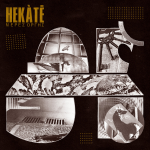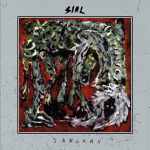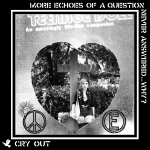HEKATE
Days of Wrath
[engl] It’s not surprising that Hekát? chose their name after the ancient Greek goddess Hekate, the deity of the underworld, witchcraft, nighttime and crossroads. Hekát? are four women coming from different paths, all of which converged in the Spring of 2018, and met at the great crossroad of Athens’ eternal night. Their music is multi-referential, an explosive mix of their magic potions. The heavy, melodic bass establishes the base of their post-punk sound. The drums derail it where necessary. The synths, more electric than electronic, can be heard distinctly, at times leaning towards a smarter New Wave but also giving a wink at garage rock. The vocals sound like an enraged, rhythmic recital tightroping along the melody. As a result, their eight tracks move along a scale, starting with melancholic, urban hymns and ending in anxious, frenzied chases, all tied together with a ceremonial atmosphere.
The record title, Days of Wrath, is a translation of the Medieval hymn “Dies Irae,” which warns of God’s wrath, which will come down on the people during the Second Coming. Through their lyrics, Hekát? turn their wrath towards God, the people who created Him and the constricting world those people sustain. It starts out like a cry for help and climaxes into a war cry.
Hekát?’s war cry is the voice of a generation of emancipated women in motion. With few similar examples across the Greek scene, it comes as the result of their own liberation and of the many who came before them, paving the way. As political beings, Hekát? cannot but reflect their own gender identity in their music. An identity that—whether on stage or on record, or out there in the high-speed jungle of Greek society—expresses emotions from discomfort to aggression, as it is by definition obstructed by outdated and invisible privileges. For those who don’t wish to understand, they explain it, cut and dry, with their track-manifesto “Soapbox,” reminding them: “You think you see me? Well, you see shit!”
However, do not be disheartened. Days of Wrath is not some wooden, incomprehensible declaration of ideas. It is a deeply poetic, atmospheric record, doused in cloudy melodies that know when to hit the gas to carry the listener to the other side







